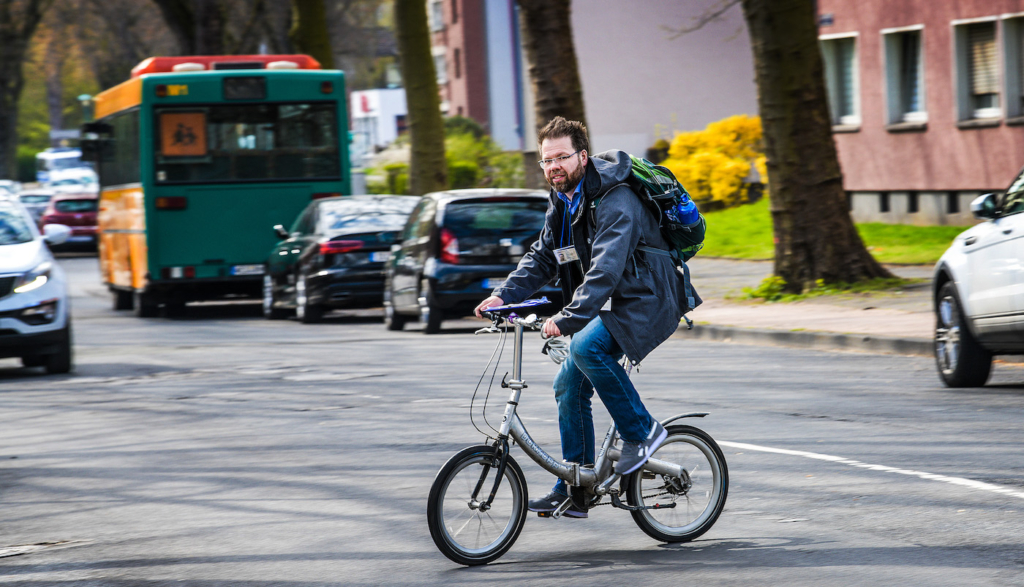Knocking on Doors for Science
How do Germans with a family history of immigration vote? Little is known about this, but a team led by the political scientist Prof. Dr Achim Goerres is working to change that. An interview.
Professor Goerres, there’s no lack of election studies. So where’s the problem?
Although immigration is one of the major societal changes in Europe, it’s hard to find studies on voters with an immigrant background in almost all countries. In Germany, studies have focused on different groups of immigrants, but not to explain their voting behaviour. We were the first in 2017 with the Immigrant German Election Study IMGES, and in 2021 we conducted a follow-up study. The methodology behind our surveys is technically complex, time-consuming, and expensive.
What’s special about this second study?
We didn’t conduct the study on the parliamentary election nationwide, but instead only in Duisburg. The 1,500 participants from the following four groups were selected randomly: Germans without an immigrant background, Germans of Turkish descent, Russian Germans, and Germans with any other immigrant background.
Nobody volunteered to participate, as with the low-quality surveys that unfortunately get far too much media coverage. We spent weeks going from door to door to motivate the people who had been selected to take part. Since we all polled everyone several times, through the entire 2021 election campaign into November, in the middle of the coronavirus lockdown, you can imagine how much effort that involved.
Why Duisburg?
Our approach would not have been feasible for Germany as a whole. That’s why we needed a city in which is already reality today what will apply to other municipalities and rural districts in five to ten years. Duisburg is the prototype of the modern city: diverse, unequal, democratic. There are widely different lifeworlds in a relatively small space. For example, look at the well-to-do borough Baerl and compare it with Obermarxloh. Poverty and other socially isolating factors vary massively. This is also true of voter turnout, which can range between 80 and 50 per cent depending on the borough.
In addition, there’s a heterogeneity of origin: 20 percent of Duisburgers with German citizenship have their roots in other countries. This number will grow because half of the boys and girls in nursery school have an immigrant background. Duisburg is thus a frontrunner of a development that must interest us, not only in election research.
Because we were on location, we were able to analyse in detail things like what role the social and political environment of the respondents played for their vote. We were able to take a closer look at the four surveyed groups: for example, to see whether people of Turkish descent from poorer neighbourhoods are more political than people of Turkish descent from richer areas. We were able to examine what the media reported about Duisburg politics, how the election campaign unfolded in the 46 boroughs, and much more. As a result, we have an incredibly rich and very unusual data set that we are gradually working our way through, also with the help of big data methods.

Russian Germans vote the Christian Democratic Union, Turkish Germans the Social Democratic Party. Is that still true?
No, this pattern, which was true for decades, is outdated. Most of the people from these two groups have been here a long time; over the generations, the old party preferences have worn off and become like those of Germans without an immigration history. Voter turnout is also only slightly lower. Most voters with foreign roots have a sense of belonging to Germany and are satisfied with democracy. We see the theory invalidated that they do not recognise the political institutions as their own. The same applies to the exaggeration widely disseminated in the media that the far-right Alternative for Germany is the party of the Russian Germans.
If voting behaviour can no longer be determined on the basis of immigration background, what’s the key factor?
It’s the mobilising effect of parents. We asked the respondents how they were raised with regard to politics, what their parents’ level of education is, when they became naturalised citizens, and whether they then took advantage of their right to vote. The mechanisms are the same with all of them – no matter what their origin: If young people grow up in a household, where elections are often a topic of conversation, they will be much more likely to vote themselves later on.
What needs to change?
Voter turnout is decreasing in general. That isn’t good for democracy, because it makes elections less representative. The question is: how do you get people to go to the polls? By targeting first-time voters more. By formulating the ballot differently – Why does it have to sound like a fee notice? By reminding people to cast their vote as in other countries, informing voters in several languages, and making postal voting easier. Postal voting is used less by people with a family history of immigration. Briefly stated, we need to make elections more accessible, because not being familiar with the process is a deterrent.
‘Why does the ballot have to sound like a fee notice?’
What are you investigating at the moment?
We’re doing several things. For example, we’re analysing what political information the respondents in our study consumed. We’re looking at whether the intensity of the election campaign had a mobilising effect.
It’s possible that the lower voter turnout in certain parts of the city is due to the fact that none of the parties were present there or because they spent a lot of time there. According to our analysis so far, Duisburg was a barometer for the entire country in the 2021 parliamentary election. And that’s exciting with a view to 2025.
When do you aim to be finished?
It will definitely take us until the end of 2024 to complete the entire analysis.
The interview was conducted by Ulrike Bohnsack.
IMMIGRANT GERMAN ELECTION STUDY (IMGES)
These two studies are unprecedented, as the German Research Foundation (DFG) also found: They are the first to provide precise data on the voting behaviour of Germans with a family immigration history in parliamentary elections. A family immigration history is present when a person him/herself or at least one of their parents was born abroad. IMGES I was conducted nationwide in 2017, IMGES II, due to the different research design, as a representative panel study from May to November 2021 in Duisburg.
Achim Goerres is a professor of empirical political science. He conducted both surveys with his assistant Jonas Elis and with Prof. Dr Dennis C. Spies (Düsseldorf, deceased in 2021) and Prof. Dr Sabrina J. Mayer (previously UDE, now Bamberg). The DFG funding runs until 2024.
Main image: © unsplash



